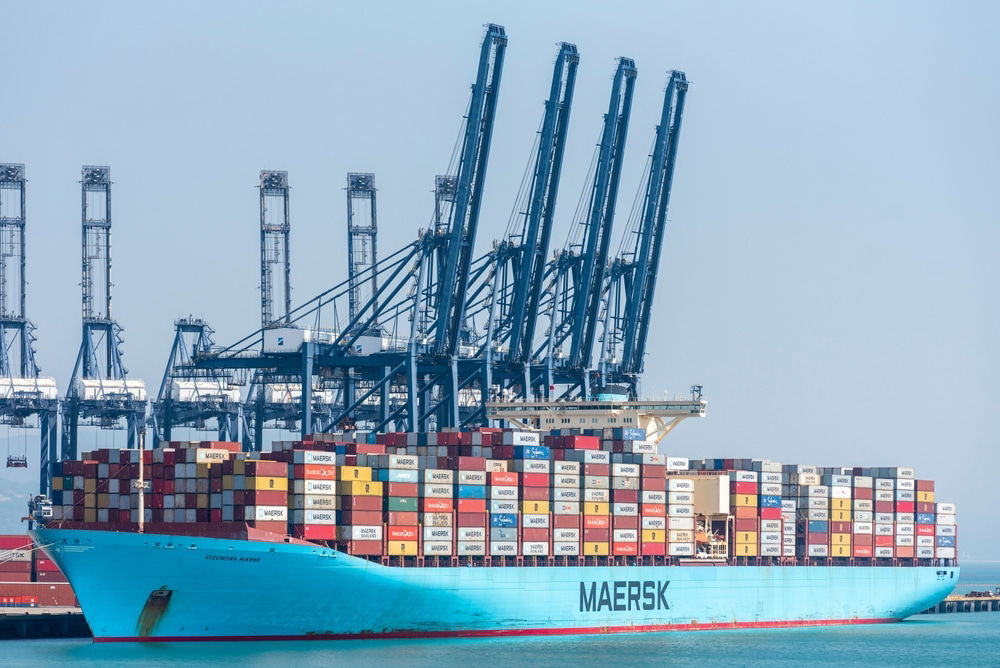Nuclear energy offers a potential game-changer for the shipping industry, which currently relies heavily on fossil fuels. With global shipping responsible for almost 3% of greenhouse gas emissions, there is an urgent need to explore clean energy alternatives. And the integration of nuclear energy into the shipping industry is gaining momentum as a promising solution for zero-emission shipping.
Danish shipping giant Maersk has joined forces with Lloyd’s Register (LR) and UK company Core Power to explore the potential for nuclear-powered container shipping in Europe. This collaboration represents an important step in the shipping industry’s efforts to decarbonise.
Together for nuclear-powered shipping
The study will examine the feasibility of a fourth-generation nuclear reactor to power container ships. Unlike conventional nuclear reactors, these small and mass-produced reactors are designed to consume less nuclear fuel while having lower power. The partnership will assess the necessary legal framework and safety requirements for operating nuclear-powered vessels in European waters.
Ole Graa Jakobsen, Head of Fleet Technology at Maersk, acknowledged the challenges associated with nuclear power, but also pointed out that if these challenges are overcome, nuclear power could become a viable decarbonisation option for the logistics industry within the next 10 to 15 years.
Nick Brown, CEO of Lloyd’s Register, highlighted the role of nuclear energy in the shipping industry, saying:
“A multi-fuel approach to decarbonising the shipping industry is critical to ensuring that we as an industry meet the IMO’s emissions reduction targets. And it is becoming clear that nuclear propulsion will play a key role in this energy transition.”
Mikal Bøe, CEO of Core Power, echoed Brown’s sentiments, noting: “Without nuclear, there is no net zero.”
The maritime sector is increasingly looking at nuclear fuel as a potential solution to reduce its carbon footprint. A survey conducted by the International Chamber of Shipping in May 2022 showed growing interest in nuclear-powered merchant vessels, with some experts predicting their profitability within the next decade.
The collaboration between Maersk, LR and Core Power signals a forward-looking approach to reducing the environmental impact of shipping.
Advanced nuclear reactors: the next frontier in decarbonising shipping
Nuclear power has long been used in warships since the 1950s, but the urgent need for decarbonization is driving its application in commercial shipping to new heights. The US is studying the potential of maritime nuclear reactors to replace ageing fleets and meet the International Maritime Organization’s (IMO) goal of reducing carbon emissions by 50% by 2050.
Among the various nuclear energy technologies available, SMRs (small modular reactors) are particularly attractive for maritime applications due to their compact size and improved safety features.
SMRs are smaller and more flexible than conventional nuclear reactors, making them suitable for installation on ships. SMRs could provide ships with a constant supply of energy and enable them to travel long distances without having to make frequent refueling stops. This could be particularly beneficial for large cargo ships and icebreakers operating in remote areas.
MSRs, a type of SMR, offer even greater potential due to their ability to operate with different fuel cycles, including thorium, and allow longer refueling intervals.
Countries such as the USA, South Korea and Denmark are pioneers in the development of such reactors for maritime use. For example, the Danish company Seaborg Technologies is working on a compact Gen IV fluoride salt reactor with a 12-year refueling cycle that is intended for use on floating power plants.
Why nuclear power could be the key
One of the most compelling reasons to consider nuclear energy for maritime shipping is its potential to reduce greenhouse gas emissions. Nuclear-powered ships do not emit carbon dioxide during operation, unlike conventional ships that burn fossil fuels. Even more remarkable, nuclear energy produces four times less carbon dioxide emissions than solar farms.


Additionally, Compared to fossil fuels, nuclear power produces minimal waste, and advances in waste management have made it safer and more manageable.
In addition, nuclear energy provides a high level of energy security and independence for ships. Unlike fossil fuels, which are subject to price fluctuations and geopolitical tensions, nuclear fuel is abundant and can be sourced from several countries.
While the potential of nuclear-powered ships is significant, there are also challenges related to regulatory approval, public perception, and the high initial costs of reactor development. Nevertheless, countries such as Russia, China, and the United States are making progress in overcoming these hurdles.
Russia, for example, already operates nuclear-powered icebreakers and floating power plants, demonstrating the feasibility of nuclear technology in harsh marine environments.
In the United States, the use of nuclear energy in maritime shipping could revitalize the domestic fleet, especially under the Jones Act. The regulation requires that goods transported between U.S. ports must be carried on ships built and operated in the United States.
Could nuclear power revolutionize shipping?
The development of SMRs and advances in nuclear technology are making it increasingly possible for merchant vessels to be powered by nuclear energy. However, careful consideration of safety, regulatory and public perception issues will be crucial for the future development of the industry.
In conclusion, nuclear energy represents a promising opportunity for the shipping industry to reduce its environmental impact and increase energy security. While many challenges remain to be overcome, the potential benefits make nuclear energy an option worth exploring.
With continued research and development and the creation of appropriate regulatory frameworks, nuclear-powered commercial shipping could become a reality in the coming decades.

